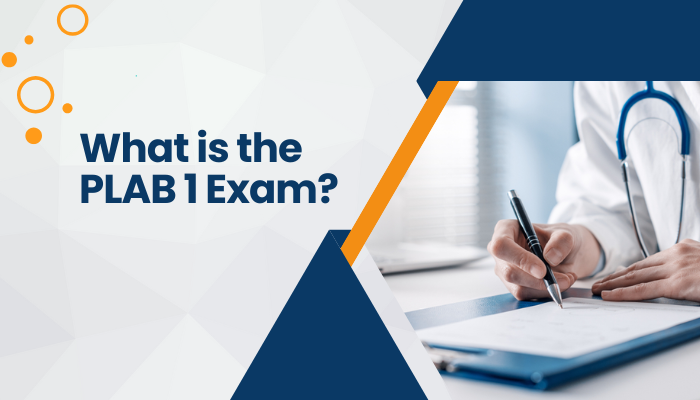If you’re planning to sit the PLAB 1 exam, this guide will walk you through the entire process. From preparation tips and practice resources to booking details and exam-day essentials, we’ve got you covered. You’ll also find out how to check your results and what steps to take afterwards.
What is the PLAB 1 Exam?
PLAB 1 is basically an applied knowledge test (AKT). Instead of checking how many facts you’ve memorised, it looks at how well you can use your medical knowledge to care for patients. The questions are built around real-life scenarios, based on UK best practices and the kind of equipment you’d actually find in NHS hospitals. Your answers should reflect published evidence, not local guidelines from back home. Plus, PLAB 1 is fully aligned with the Medical Licensing Assessment (MLA) standards.
What Does the PLAB 1 Exam Cover?
PLAB 1 mainly tests how you’d handle the kinds of cases a doctor at Foundation Year 2 (F2) level would face in the UK. That means questions on common illnesses, urgent conditions you’d see in A&E, and the management of long-term health problems in primary care. Don’t worry it doesn’t go into the advanced responsibilities of a GP.
How Do You Answer the Questions?
PLAB 1 is a written exam with 180 multiple-choice questions, and you’ll have three hours to get through them. Each question starts with a short clinical scenario, followed by a question. You’ll then pick the best answer from five options.
When and Where Can You Take PLAB 1?
When can you take the exam?
PLAB 1 is held four times a year in February, May, August, and November. You can sit the exam in the UK or at selected overseas centres.
To check available dates and book your spot, you’ll need to create a GMC Online account and use their PLAB booking service. Keep in mind, places fill up quickly: bookings for overseas centres close about six weeks before the exam, while UK bookings close two weeks before.
Because spaces are limited and always in demand, the GMC spreads them out as fairly as possible across the year. If you already have a confirmed NHS job offer that requires GMC registration, or if you hold UK refugee status
Where Can You Take the Exam?
In the UK, PLAB 1 is held in several major cities: Belfast, Birmingham, Cardiff, Edinburgh, London, Manchester, Oxford, and Sheffield.
Within Europe, you can also sit the exam in Dublin or Madrid.
- If you book a UK or EU exam, you’ll get your venue details within 7 days of your test. These are sent by VICTVS, the GMC’s approved supplier who manages and invigilates exams in those regions.
- If you’re sitting the exam outside the UK or EU, the British Council will send you the venue information directly.
Tip: Only contact VICTVS or your local British Council office if you haven’t received your venue details at least a week before your exam date.
Information on booking a PLAB 1 place
Booking a PLAB 1 Place: Am I Eligible?
To book your PLAB 1 exam, you’ll first need an acceptable overseas primary medical qualification. If you haven’t officially graduated yet, you must at least have proof that you’ve passed your final exams and met all the requirements for your degree.
You’ll also need to show proof of your English language skills. The GMC accepts IELTS or OET as the main evidence. In fact, their 2022 report showed that candidates who took IELTS or OET were more likely to pass PLAB 1 on their first try. So even if you have other ways to prove your English, it’s strongly recommended to take one of these tests.
Once your English evidence is verified, you can create a GMC Online account (or update it if you had one before August 2021). From there, you’ll be able to access the PLAB booking system to reserve or cancel a spot.
A quick heads-up: there’s a limit on attempts. You can sit PLAB 1 up to four times. If you fail all four, you may apply for one additional attempt. But if you fail that fifth try, you won’t be allowed to take the exam again.
How Do I Book a PLAB 1 Place?
You can check available dates and book your PLAB 1 exam through the GMC Online PLAB booking service. The GMC keeps a close eye on demand and opens new spots as needed, and you can see upcoming openings in the booking system.
Cost:
For current fees, check the PLAB fees tab on the GMC website.
Can I swap my booking?
Yes, but you’ll need to cancel your current booking first before reserving a new date. The GMC will charge a cancellation fee, so make sure to read the guidance in the booking service carefully before making changes.
Can anyone else book for me?
Nope. Only you can book through your own GMC Online account. Sharing your account or letting someone else book on your behalf is considered misconduct and could affect your registration or exam eligibility. Plus, it puts your personal info at risk.
Concessions for refugees
If you’re a refugee doctor in the UK, your first two PLAB 1 attempts are free. Just book online and contact the GMC to arrange a refund.
Cancelling on the exam day
If something happens during the exam like you’re unwell and can’t continue, tell an invigilator immediately so they can guide you on the next steps.
Can You Get a Refund on the Cancellation Fee?
The GMC may give a full refund if something truly exceptional stops you from attending your exam like visa refusal, travel restrictions, serious illness, or a bereavement.
If you think you qualify, first cancel your booking, then email proof of your situation. The GMC will review your case and decide if the cancellation fee can be refunded.
You can also check their guidance on what to do if you’re sick or absent on the exam day.
What If You Become Unwell During the Exam?
When you start the exam, you’re confirming that you’re well enough to take it. If your health changes during the test and you can’t continue, tell an invigilator immediately so they can advise you on the next steps.
What If the Exam Is Cancelled by the GMC or Their Providers?
The GMC plans to run PLAB 1 exams as scheduled throughout the year at multiple venues. However, on rare occasions, an exam may need to be cancelled.
If this happens, affected candidates will be notified as early as possible. Booking fees will be automatically refunded, and the GMC will try to offer an alternative exam date when possible.
Important: the GMC cannot cover extra costs like visas, travel, or accommodation, and no additional compensation will be provided.
What If Your Eligibility to Take PLAB Expires Due to Exceptional Circumstances?
Normally, candidates have plenty of time to sit the exam. But sometimes, unexpected situations like war, serious health problems, pregnancy or maternity issues, travel restrictions, or mandatory military service can stop you from taking it in time.
If this happens, contact the GMC as soon as possible. They’ll review your case and may offer support, like letting you sit an earlier exam or extending your eligibility period.
The MLA Content Map
The Medical Licensing Assessment (MLA) content map is your roadmap for the exam. It shows exactly what knowledge, skills, and behaviours you need to demonstrate—not just to pass the test, but also to work safely as a doctor in the UK. Everything you need to know for PLAB 1 is included in this guide, making it a key tool for your preparation.
The Foundation Programme Curriculum
The topics and clinical areas in the MLA content map match what doctors usually encounter in Year 2 of the UK Foundation Programme. This ensures that anyone who passes PLAB 1 is working at the same level as UK-trained doctors.
You can also take a look at the full Foundation Programme curriculum for more details.
Guidance and Interactive Tools
At the heart of UK medical practice is Good Medical Practice—the standards and behaviours the GMC expects from all doctors. When you take PLAB 1 and later work in the UK, you’ll need to show these professional values in action.
To help you prepare, the GMC offers tools where you can build and test your knowledge, including:
- Explanatory guidance on key principles
- Good Medical Practice in Action interactive online tool
- Welcome to UK Practice interactive online tool
These resources are great for understanding what’s expected in real-life scenarios and for boosting your confidence before the exam.
Courses
You don’t need to take a course to pass PLAB 1, but many candidates find them helpful. The GMC does not offer or endorse any courses, and they don’t monitor the quality of external courses.
Do you require adjustments to your exam due to a health need?
What can we do to support you?
If you have a health condition that might affect your performance, the GMC can make reasonable adjustments to the exam setup. These changes don’t alter the exam standard, but they help make it accessible for everyone.
Adjustments are considered case by case, based on the evidence you provide. Some examples from PLAB 1 include:
- Motor difficulties or impaired vision:
- Extra time to complete the exam
- Written material in large print and on maize-coloured paper
- Exam held at a regional office to reduce travel
- Extra time to complete the exam
- Dyslexia:
- Extra time to complete the exam
- Separate exam room
- Use of a coloured overlay
- Extra time to complete the exam
- Pregnancy:
- Seat near the toilet
- Female invigilator to escort to the toilet if needed
- Seat near the toilet
What You Need to Do to Request Exam Adjustments
To get reasonable adjustments for PLAB 1, you’ll need to provide a few key pieces of information:
- Explain why you need the adjustment – describe your health needs and how they might affect your exam performance.
- Specify the adjustments you’re requesting – or explain the barriers you need them to address.
- Provide official evidence – a letter, certificate, or medical report from a qualified professional confirming your health needs and how they impact you in an exam setting.
Make sure your documentation clearly states:
- Which part of the exam it relates to (Part 1 – multiple choice, or Part 2 – OSCE)
- Recommended adjustments (e.g., how much extra time you need and why)
Without this information, the GMC cannot make a decision, so delays may occur if anything is missing.
When Should You Request Exam Adjustments?
If you think you’ll need any adjustments, it’s best to contact the GMC before booking your exam. This gives them enough time to review your request and schedule a date where your required adjustments can be provided.
If you book an exam first and then request adjustments, the GMC might not be able to make the changes for that date.
Already booked your exam but need adjustments? Get in touch as soon as possible—your test may need to be rescheduled to allow the adjustments to be put in place.
What to Expect on Exam Day
When Should You Arrive?
Once your exam is confirmed, the GMC will tell you the exact arrival time. You’ll get your venue details at least 7 days before the exam, sent by either the British Council or VICTVS, depending on your location.
Be on time! If you’re more than 30 minutes late, you won’t be allowed into the exam room. Likewise, you cannot leave during the first or last 30 minutes of the test.
Plan to be at the centre for at least four hours, so bring anything you might need for comfort during that time.
What Should You Bring to the Exam?
Identification:
You’ll need to bring proof of ID. The following are accepted:
- Passport
- UK Immigration and Nationality Department ID
- Home Office travel document
- UK driving licence
- EU identity card
If you don’t have any of these, you can still take the exam, but you’ll need to provide your ID or proof of a name change later. When you attend, the centre will also take a digital photo and your signature for records.
Booking Confirmation
Make sure to bring your booking confirmation with your GMC reference number.
If the name on your ID doesn’t match the name on your booking confirmation, you’ll also need to bring original proof showing that both names belong to you. Acceptable documents include:
- Marriage certificate
- A declaration from the body that awarded your primary medical qualification
Stationery
Bring your own HB pencils, an eraser, and a pencil sharpener to the exam.
Other Items
You’re allowed to bring:
- A clear water bottle (labels removed)
- One or two pieces of fruit for a snack
- Any medication you need
Important:
- Watches of any kind—including analogue, digital, and smart watches—are not allowed in the exam hall. The time will be displayed, and invigilators can give time checks.
- UK winters can be cold, so you’re welcome to bring a jumper or cardigan for comfort.
What Not to Bring
Leave these items at home:
- Calculators or any other equipment
- Wristwatches (analogue, digital, or smart)
- Coats, bags, phones, or other electronic devices
Also, family and friends cannot wait in the exam venue—there are no waiting areas, and they won’t be allowed inside under any circumstances.
What to Do if You’re Unwell on Exam Day
Before the Exam
If you’re too unwell to attend or feel too sick to start after arriving, let the GMC know as soon as possible. This helps them advise you on next steps and any options for rescheduling or refunds.
During the Exam
When you start the exam, it’s assumed you’re well enough to be assessed. If your health changes and you cannot continue, tell an invigilator immediately.
If you have an underlying health condition or are clinically vulnerable, you’re allowed to wear a face mask for extra protection.
Expected Conduct During the Exam
Before attending, make sure you’re familiar with the misconduct procedures. Following the rules helps ensure the exam runs smoothly and fairly for everyone.
Your Results
When Will You Get Them?
PLAB 1 results are usually published six weeks after the exam. If there’s any delay, the GMC will contact you directly to let you know.
Where Can You See Your Results?
When your PLAB 1 results are ready, you’ll get an email explaining how to access them in the ‘My Tests’ section of GMC Online.
Results will stay available in GMC Online if you later gain GMC registration.
If you can’t view your results online, contact the GMC for help. Results are not given by phone or at the GMC reception, so always check online first.
PLAB 1 Exam and Result Dates
Here’s a handy list of recent and upcoming PLAB 1 exams with their corresponding result dates:
- 20 February 2025 → Results by 3 April 2025, 4pm
- 22 May 2025 → Results by 3 July 2025, 4pm
- 7 August 2025 → Results by 18 September 2025, 4pm
- 6 November 2025 → Results by 18 December 2025, 4pm
Keep this list handy so you know when to expect your results.
How Your PLAB 1 Score Is Calculated
Each correct answer is worth one mark. Your total score is simply the number of correct answers you give.
When you get your results, you’ll see:
- Your total score
- The score needed to pass
- The average score for all candidates
This helps you see not just whether you passed, but also how you compare with other candidates.
How Feedback on Your Performance Is Provided
PLAB 1 questions are grouped into ten key clinical areas, based on the MLA content map:
- Reproductive health
- Renal and urology
- Neurosciences and senses (including skin)
- Musculoskeletal
- Mental health
- Gastrointestinal
- Endocrine, metabolic, and clinical hematology
- Child and adolescent health
- Cardiorespiratory
- Ethics and other
Your results will show the percentage of questions you got right in each area, along with the average percentage for all candidates. This helps you see where your strengths and weaknesses are.
How the Pass Mark Is Set
The PLAB 1 pass mark is determined using the internationally recognised Angoff method, with one standard error of measurement included. This ensures the pass mark is consistent over time and reflects the level expected of a doctor starting Year 2 of the Foundation Programme.
After each exam, a team of experts reviews the paper to make sure all questions and answers are fair.
There is no fixed pass rate or average score, and the GMC may update the standard-setting process from time to time without notice.


